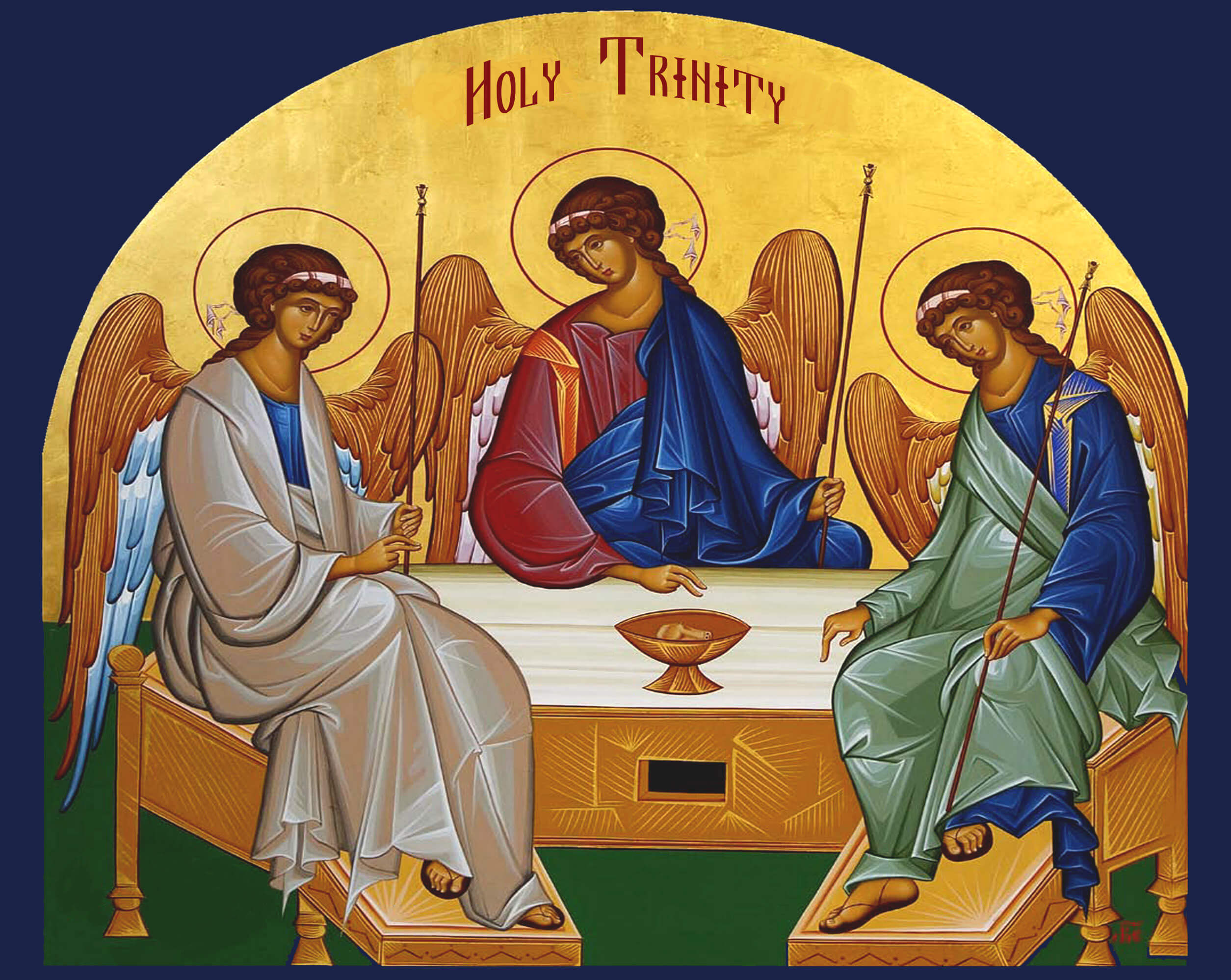Proverbs 8:1-4, 22-31 Psalm 8 Romans 5:1-5 John 16:12-15
The Journey to God in Three Persons
Homily for Trinity Sunday, May 22, 2016 by Sherman Hesselgrave
Today is Trinity Sunday, our Feast of Title, and I am inviting you to join me for an abbreviated recap of the journey to God in Three Persons, with a couple excursions to hear how the Trinity has entered into the creative imaginations of a few literary and musical geniuses.
שְׁמַע יִשְׂרָאֵל יהוה אֱלֹהֵינוּ יהוה אֶחָד
Hear, O Israel: the Lord is our God, the Lord alone.
These words from the book of Deuteronomy, as well as the first of the Ten Commandments (No other gods; No graven images; No taking God’s name in vain), assert the central importance of monotheism in Judaism. The scholarly consensus is that monotheism did not become firmly established in Israel until the reign of Josiah in the 7th century BCE—more than a thousand years after Abraham and Sarah may have lived, and 600 years after the Exodus, but pious Jews take these commandments to heart to the present day. Whenever observant Jews encounter the divine name for God given to Moses at the burning bush, the Hebrew letters of which we transliterate YHWH, they substitute the word Adonai, Hebrew for ‘Lord’. The meaning of the divine name, which we Christians pronounce aloud quite freely as Yahweh, can be translated either as I AM or I WILL BE. Richard Niebuhr, in his book, Radical Monotheism and Western Culture, brings together Moses’ revelatory moment with the burning bush and the story of Creation in Genesis: “Radical monotheism,” he writes, “dethrones all absolutes short of the principle of being itself. At the same time it reverences every relative existent. Its two great mottoes are: ‘I am the Lord they God; thou shalt have no other gods before me’ and ‘Whatever is, is good.”
The characterization of the Messiah (literally God’s ‘Anointed One’) in the Hebrew Scriptures is that he would be a great political leader descended from King David. The idea that the Messiah would be God or a pre-existent Child of God was beyond imagination. Even the most cursory examination of the life of Jesus as portrayed in the gospels would tend to support the notion that Jesus was more focussed on reforming Judaism than in starting a new religion. But after the crucifixion of Jesus, the story of the resurrection turned the narrative in a different direction. The Christological controversy—in what way is Jesus God?—would not be resolved until the Council of Chalcedon in 451, which asserted that Jesus Christ was “truly God and truly human.” Next year, Canada celebrates the sesquicentennial anniversary of Confederation. One hundred and fifty years of history. By comparison, it took three times as long for the Christian Church to reach this consensus on the second person of the Trinity.
Along the way there are stories describing the lively engagement of the citizenry in the debate. For example, in the 4th century:
NANCY WHITLA:
Gregory of Nyssa mentions the money-changer who,
if asked the exchange rate, replied with a dissertation on Christ being begotten and not made;
you go to the baker’s shop: the Father, he tells you, is greater than the Son;
at the hot baths you ask whether your bath is ready: you are told that the Son came from nothingness.
SHERMAN: That is from his treatise On the Divinity of the Son and the Holy Spirit.
A nice segue to the third Person of the Holy Trinity. Despite the often-quoted commission Jesus gives to disciples at the end of Matthew’s gospel:
“…Go therefore and make disciples of all nations, baptizing them in the name of the Father and of the Son and of the Holy Spirit, and teaching them to obey everything that I have commanded you. And remember, I am with you always, to the end of the age.”
do not think that there was anything like a coherent doctrine of the Trinity when those words were first written. Jesus mentions the Holy Spirit repeatedly, and especially toward the end of his ministry as recorded in John’s gospel. Today we heard: “I still have many things to say to you, but you cannot bear them now. When the Spirit of truth comes, it will guide you into all the truth.”
A bishop I know posted on his Facebook page yesterday a photograph of the Dowager Duchess from Downton Abbey with the caption: “Please don’t say ‘perichoresis’ in your Trinity Sunday sermon; it sounds vulgar.”— ‘Perichoresis’ being a Greek word that describes the relationship between each person of the Trinitarian Godhead. And yes, it took the Church centuries to agree to the language we use to wrap around the mystery that is the Triune God.
At different times and in various strands of Christian tradition, the individual Persons of the Trinity have been regarded with varying emphasis: the Pentecostals focussing on the gifts of the Spirit—glossolalia, healing, prophecy, discernment; some Christians have been more comfortable relating to Christ’s humanity, and others, Christ’s transcendence. What they all have in common is a way of EXPERIENCING God in Three Persons, the Holy Trinity.
John Donne, the English poet and cleric, was born during the reign of Elizabeth the First, and died as the Dean of St Paul’s Cathedral, wrote this Holy Sonnet:
BILL WHITLA:
Batter my heart, three-person’d God, for you
As yet but knock, breathe, shine, and seek to mend;
That I may rise and stand, o’erthrow me, and bend
Your force to break, blow, burn, and make me new.
I, like an usurp’d town to another due,
Labor to admit you, but oh, to no end;
Reason, your viceroy in me, me should defend,
But is captiv’d, and proves weak or untrue.
Yet dearly I love you, and would be lov’d fain,
But am betroth’d unto your enemy;
Divorce me, untie or break that knot again,
Take me to you, imprison me, for I,
Except you enthrall me, never shall be free,
Nor ever chaste, except you ravish me.
SHERMAN: Other poets, with their ability to engage our minds in powerfully imaginative ways, have been inspired to pierce the mystery of what we celebrate on this day:
Malcolm Guite’s
Trinity Sunday; A Sonnet
In the Beginning, not in time or space,
But in the quick before both space and time,
In Life, in Love, in co-inherent Grace,
In three in one and one in three, in rhyme,
In music, in the whole creation story,
In His own image, His imagination,
The Triune Poet makes us for His glory,
And makes us each the other’s inspiration.
He calls us out of darkness, chaos, chance,
To improvise a music of our own,
To sing the chord that calls us to the dance,
Three notes resounding from a single tone,
To sing the End in whom we all begin;
Our God beyond, beside us and within.
To conclude today’s reflection on the Journey to God in Three Persons, I have asked Ian Grundy to play one of Johann Sebastian Bach’s creations inspired by the Holy Trinity: the Fugue in E-flat, a key with three flats. The fugue also has three subjects. It is nicknamed the St Anne Fugue, because the first subject sounds exactly like the beginning of the hymn tune with that name.






